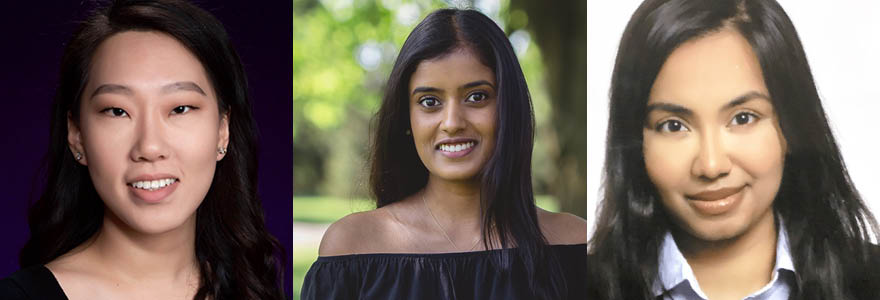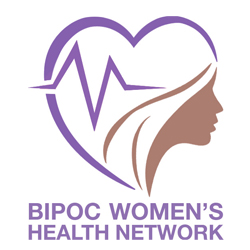Feature: Creating culturally safe, accessible health care

Jennifer Parraga, BA’93
In July 2020, second-year medical students Claire Dong, Dilini Kekulawala and Brintha Sivajohan and their peers enthusiastically undertook a summer research project focused on how Canadian medical education centres the voices of women identifying as Black, Indigenous,and People of Colour (BIPOC) and how it teaches about bodies of colour. That enthusiasm was short lived, as their data and information searches came up short showing a serious lack of studies and available literature.
“When you are left with little to no data and statistics, it’s very difficult to make a case to push for interventions and change in the Canadian system,” said Sivajohan.
Undeterred by the lack of information and armed with lived experiences and an understanding of the challenges and obstacles women from racialized and Indigenous communities in Canada face when interacting with the health care system, the trio decided to take matters into their own hands.
“Growing up, I saw female community members feel apprehensive at the thought of going to a clinic to receive care,” said Dong. “Newcomers to Canada and those whose first language isn’t English, or whose cultural views of health care differ from those in North America, just don’t know what to expect.”
The medical students set a goal to create resources and community interventions to improve health care experiences for BIPOC women. They wanted racialized and Indigenous women, along with future generations of women who are new to Canada to feel culturally safe and have access to resources.
The also wanted to reimagine medical education and identify ways in which medical learners could engage with communities of colour more meaningfully, at an earlier stage in their training.
They contacted the experts and launched what has become an enriching experience focused on making change.
Danielle Alcock, PhD, Schulich Medicine & Dentistry’s Indigenous Lead was their first call. Alcock was extremely supportive of the group. Not only did she help them to understand the inequities related to Indigenous women, she also mentored them on many aspects of their work and made some critical introductions to community leads to advance their cause.
The group also met with Western alumna Notisha Massaquoi, BA’91, PhD, who founded and served as the Executive Director of Women’s Health in Women’s Hands Community Health Centre – the only community health centre in North America, that provides specialized primary health care for Black and racialized women.
More introductions and meetings revealed the possibilities.
 In September 2020, they launched The BIPOC Women’s Health Network – a national, student-led organization with representation from 12 Canadian medical schools in six provinces across the country.
In September 2020, they launched The BIPOC Women’s Health Network – a national, student-led organization with representation from 12 Canadian medical schools in six provinces across the country.
The Network’s mission is to provide culturally competent, anti-oppressive and feminist health care resources for health care providers, medical students and racialized women in local Canadian communities. And they are focusing on six different but intersecting portfolios including gender-based violence, culturally safe resources, sexual health, gynaecological health, reproductive health and 2SLGBTQ+ health.
Not yet a year old, the Network has already secured funding, established nine projects and implemented two ongoing projects with the community.
Working with Women’s Health in Women’s Hands Community Centre they created prenatal and postpartum kits that include culturally safe information guides for the Black community. In partnership with the Trans Wellness Initiative in Alberta, they are creating a Trans health primer for medical students and have also created an online database for Transgender health and support resources across Canada, as well as a guide on Transmasculine contraception.
The founders say that establishing the Network has served as an important layer to their learning.
“Through our medical curriculum, we learn about the social determinants of health, which is so important,” said Dong. “But through the Network, I’m gaining knowledge and experience on how to meaningfully work with communities who are impacted by many social determinants and have to overcome these barriers to receive culturally safe care.”
Kekulawala agrees. “By doing this work and connecting with communities, I am realizing the practical versus the theoretical—the disconnect between the available health services versus the many intersecting barriers to receive culturally safe and appropriate care that are faced by racialized and Indigenous women,” she said.
Sivajohan says that they are doing a lot of learning, as well as unlearning, about the histories and realities of the communities they are engaging with. And most importantly, they can share this knowledge with their peers.
“I was able to help facilitate a national reading group where we discussed the topic of forced sterilization of Indigenous women to educate settlers,” Sivajohan said. “It’s such an important part of contextualizing medical mistrust.”
Grateful to work with new communities, the students say that the opportunity to meet, learn from and partner with BIPOC trailblazers has been very rewarding.
An online and active social media presence is supporting the Network’s efforts to share information and to attract new partnerships. It’s what will ensure they sustain their impact as the founding team moves through their own educational journey.
Firmly focused on being advocates today and into their future medical careers, the three future physicians have found the work they have dedicated to the Network to be enlightening and rewarding.
Their most important learning is that advocacy isn’t just a CanMEDs competency.
“Anyone in society can stand up for justice,” Sivajohan said. “But it must happen in partnership with the community and with people who have lived experience.”








